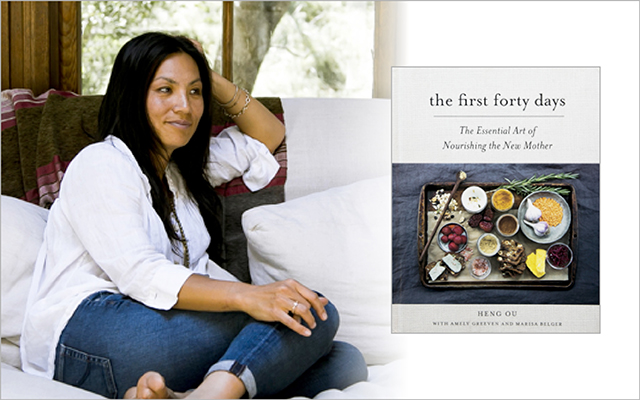The art of caring for a new mom in the United States is rarely discussed. Women are back at work within weeks, or their partners return to work after a few days — leaving them alone to heal and care for a new baby.
The United States is one of the only countries in the world without paid parental leave, so many American families lack the resources and time to bond and fully recover from pregnancy and birth.
“In the United States, follow-up care after childbirth is limited in scope and typically completed after the first six weeks,” notes a study by the Institute of Midwifery on postpartum care in the United States. “Many of the physical and emotional problems that women suffer from long-term, arise during the first two weeks postpartum, or within these 42 days.”
In contrast, other countries have long honored the postpartum period and come together as communities to support and care for the new mother and child, which in the long run creates healthier, and happier, people.
“Every country has a unique way of caring for the new mother, but each is linked by a shared thread of creating space for her to heal from the energy and effort of birth, to bond deeply with her new baby, and to rest and recover,” says Heng Ou, who with Amely Greeven and Marisa Belger, recently published The First Forty Days: The Essential Art of Nourishing the New Mother.
We talked to Ou about giving new moms permission to slow down, heal, and ask for help. Here are her tips for providing feasible and accessible ways to care for new moms — even if families aren’t supported on a societal level.
Experience Life | In your book you discuss the many rich and varied traditions of postpartum care in China, India, Korea, the Ivory Coast, Indonesia, Malaysia, Latin America, Shanghai, Hong Kong, and in Native American tribes. What are some examples of ways in which people in these countries care for new mothers?
Heng Ou | In India, a new mother may return to her parents’ home with her newborn for up to three months of dedicated care. During this time she will be fed soft, easily digestible foods; her baby will be held whenever she needs a break; and she may even receive massages with warm oil.
In Indonesia, a new mom will be visited by a midwife daily for the first few weeks after birth. The midwife will massage her, bathe her in therapeutic baths, and feed her jamu — a special, restorative dish made from egg yolks, palm sugar, tamarind, and healing herbs.
Korean new mamas will be fed miyeokguk, a traditional seaweed soup with beef, chicken, or anchovies, several times a day during the first weeks after giving birth.
The First Forty Days recounts the postpartum care traditions of many other cultures.
EL | What is so important about the first 40 days postpartum?
HO | The first 40 days postpartum are a critical time in a woman’s life. During this pivotal time, her body is recalibrating from the effort of pregnancy and birth — her hormones are ping-ponging, her uterus begins returning to its nonpregnancy size (in Chinese Medicine this is referred to as the closing of the “baby room”), and her breasts are readying for the monumental task that is lactation.
Mentally, emotionally, and spiritually, a woman begins the process of adjusting to this drastically new chapter in her life, whether this is her first baby or her fifth. By becoming a mother, she must shed an old identity and embrace a new piece of herself. This all takes time, space, and a deep acknowledgement of the significance of this moment in her life.
EL | What role does the placenta play in postpartum?
HO | More and more Western women are choosing to ingest the placenta after birth, as doing so has been found to be a key part of postpartum recovery and rejuvenation. Consuming the placenta — this can be done by making one of the delicious placenta smoothies in our book or by having the organ encapsulated or made into a potent tincture — can help to replenish nutrients lost during pregnancy and birth, decrease postpartum bleeding, and — this is my favorite — balance moodiness, which can help to keep postpartum depression at bay.
EL | How do certain foods nourish and heal a new mother — especially in the four phases of postpartum you outline in your book?
HO | During the first phase postpartum (days 1–7), a mother’s body is going through the biggest adjustment. Her hormones are moving back into their pre-pregnancy state, which can lead to feeling a bit down around day three. She will also be tender as she begins the recovery process from a vaginal birth or C-section, and her breasts will be gearing up for breastfeeding. Soft, warm, easily digestible foods are best during this period, as digestion is slow. Warm or room-temperature foods are recommended throughout the first 40 days.
During the second phase (days 8–15), a mother is likely breastfeeding actively now and her hunger may be increasing. Soft foods can be consumed indefinitely, but she may find herself turning to heartier options to remain sufficiently fueled.
In phase three (days 16–22), the baby is sleeping longer and a mother is feeling stronger, facing different challenges like the monotony of all-day baby care and constant nursing. A mother should continue to eat heartier foods, including a few nutrient-dense “power foods” like liver and greens or ginger fried rice.
The final phase (days 23–40) will often find a mother comfortable with breastfeeding and settling into more of a routine with her baby. She will now be craving a range of foods. (My book includes recipes for every stage postpartum.)
EL | What are the top foods a woman should have stocked in her pantry for postpartum?
HO | Eating during the postpartum period is not so much about specific foods as it is about following a few general guidelines to shape what you consume:
- Turn to soft, easily digestible food.
- Avoid cold foods.
- Go for good fats (think: grass and pasture-raised meat and butter, quality eggs, oily fish like salmon and anchovies, and raw plant fats and oils like coconut, olive, walnut, sesame, and avocado).
- Notice how what you eat affects your baby (e.g., does she seem extra gassy when you eat spicy food or cabbage?).
- Stay hydrated (new mothers need to replenish the fluids they lost in birth and be fueled for the next liquid expenditure: breastfeeding).
EL | Should a woman worry about losing baby weight in this 40-day period?
HO | Absolutely not! This is not a time to worry about weight. It is a period to focus on rest, recovery, and bonding with your baby.
EL | How did you blend these healing, ancient practices to make them accessible for the modern mother?
HO | I consider myself to be a fusion of so many ideas and influences. I’m an East Coast girl living on the West Coast and my cooking and healing practices are inspired by Eastern and Western sensibilities. This multilayered experience comes across in my cooking. I cook with some exotic ingredients, but most of my dishes can be made with whatever is available at the farmers’ market that week. I believe in simple, easy, flavorful food.
EL | What are the top five things you wish all new mothers and societies knew — and honored — about the postpartum period?
HO |
- Carrying a baby during pregnancy and delivering that baby out into the world is a feat of massive significance. I wish that every society honored the postpartum period as a sacred and essential time for rest and recovery.
- Taking time out during the postpartum period is not a luxury. It is a necessary part of a new mother’s journey to recovery and an essential step in her experience of healthy parenting.
- New mothers are the gatekeepers of their experience. They have the right to choose who comes into their postpartum space.
- Food is a key component of postpartum healing. Stocking the pantry and freezer with key essentials will set a new mother up for an easeful postpartum period.
- The first months home with a new baby can be as blissful as they are boring. Sometimes caring for a baby is monotonous.
EL | For someone who hasn’t had a child, but wants to support a new mom, what tips would you give them?
HO | Be a thoughtful, respectful visitor. Everybody loves a new baby, but make sure the mother’s experience is acknowledged, too. What can you do to make her life easier? And before her baby arrives, reach out and ask her how she thinks you can help during the postpartum period. Offer to come over and make meals, do laundry, clean the house, or pick up older children from school.




This Post Has 0 Comments